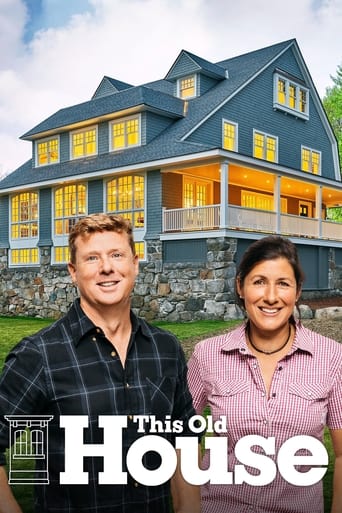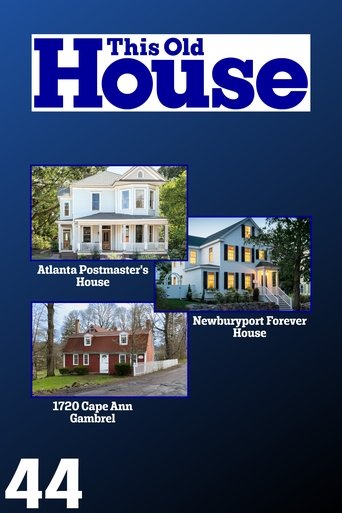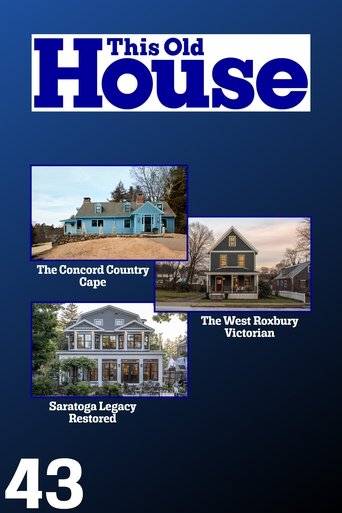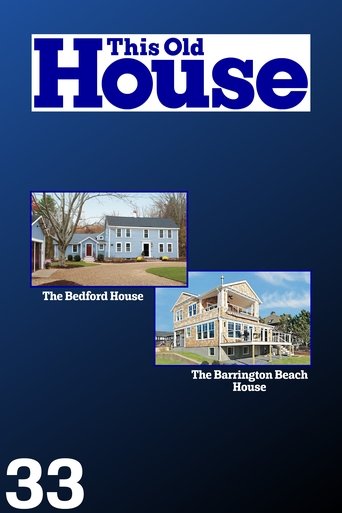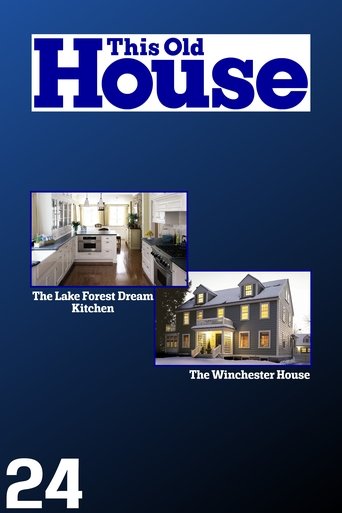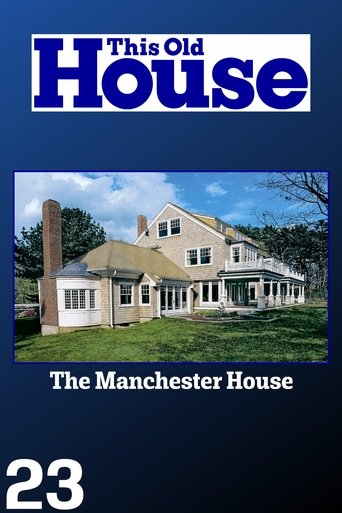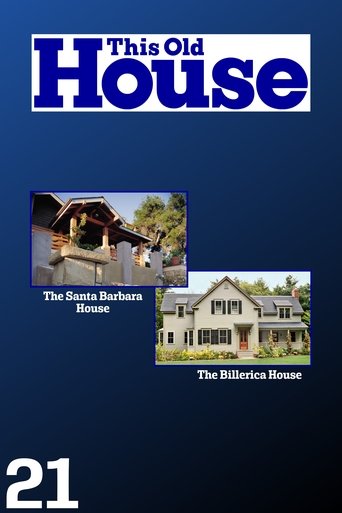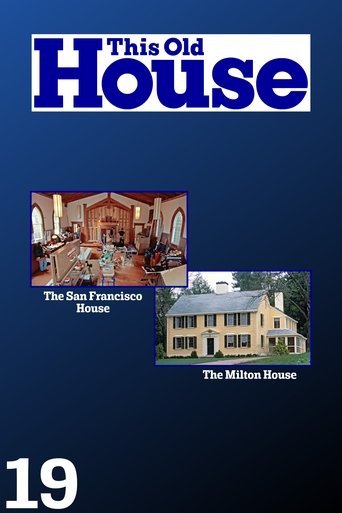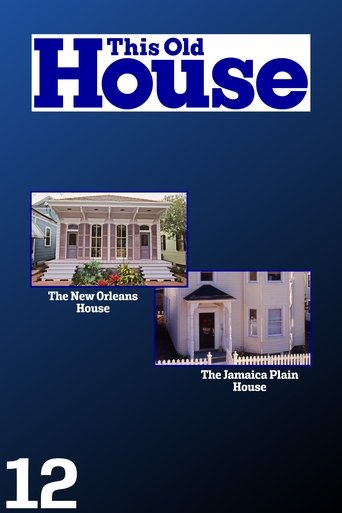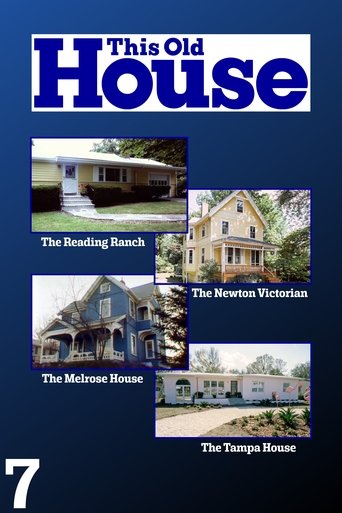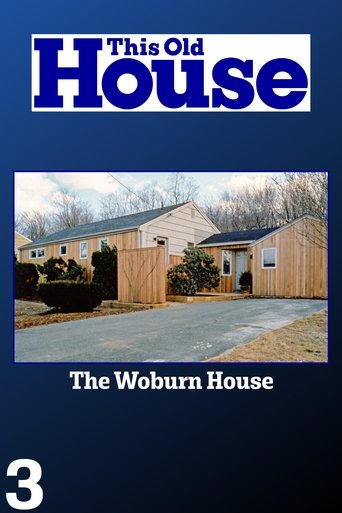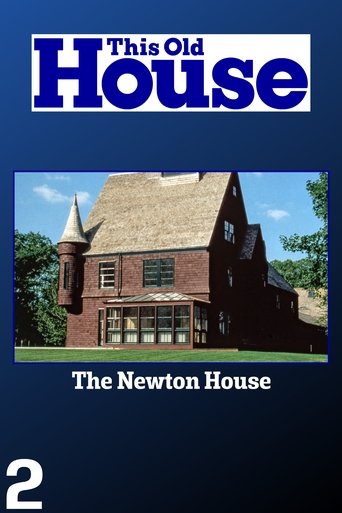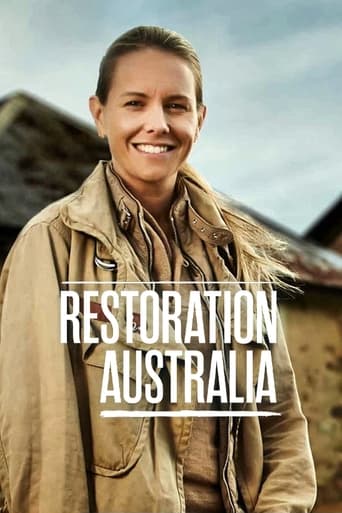This Old House Season 18

TV's original home-improvement show, following one whole-house renovation over several episodes.
Watch NowWith 30 Day Free Trial!
This Old House
1979 / TV-G


The Nantucket House; The Tuscon House
Watch Trailer
With 30 Day Free Trial!
This Old House Season 18 Full Episode Guide
As the Tucson project enters its final days, our host takes viewers to Biosphere 2 in nearby Oracle. Site of two experiments in self-sustained living, Biosphere 2 is now part of Columbia University's earth sciences program, serving as a laboratory for research into the effects of so-called greenhouse gases thought to be causing global warming. At the house, the finishing coat of the re-stuccoing system is going on, as well as a water-based highly reflective and waterproof roof coating. We check out a termite control system that uses insect growth hormones rather than poison, then tour the Meigs' beautiful new kitchen, complete with mesquite cabinets, black concrete counters, and gleaming stainless-steel commercial-grade appliances. We find cabinetmaker Tom Klijian behind his new library shelves-cum-powder room door. On the final day, Richard Trethewey arrives to check out the master bath, with walk-in closet with custom shelving, whirlpool bath, separate toilet/bidet room and a mahogan
After a trip downtown to Tucson's Hotel Congress, built in 1919 and the site of John Dillinger's hideout back in 1934, we return to the Meigs' house, concrete pavers are laying the driveway - consistent in size but varied in color, they form a hard-wearing cobblestone-like surface. We inspect the outdoor kitchen's gas barbecue, whie in the indoor kithcen cabinetmaker James Vosnos puts the finishing touches on the mesquite cabinetry. James Murdock puts the finishing touches on the ""endless"" pool, while NCAA swimmer Sean Pepper test it out. Our plumbing and heating expert checks out the house's water treatment equipment, then takes viewers around Tucson to see the ongoing challenges the city faces in its struggle to satisfy its water needs. Our host takes a look at a new privacy glazing in the master bath - it uses a liquid crystal and electricity to switch between transperancy and opacity while the flooring contractors finish up the library floor.
Before heading to the job site, we pay a visit to the Air Force's AMARC, a vast collection of mothballed aircraft preserved in the Tucson desert for use as parts, for storage, or for destruction. As the Meigs' house, Mexican tile is going down in the courtyard, the new mesquite kitchen cabinets are in place, and we see the process of putting in poured concrete countertops, a first for This Old House. The library cabinet is the work of Tom Klijian, who has fashioned floor-to-ceiling bookshelves out of black walnut. Viewers take a tour of Tucson straw bale houses - one finished, one under construction with expert Matts Myhrman and builder John Woodin. Tucson is a national center of this environmentally friendly building technology. Back on site, a beautiful set of glass doors seals off the steam shower.
The show opens with a visit to the Arizona-Sonora Desert Museum, where the natural-looking environments are the result of painstaking human artistry, including the casting and construction of artificial rocks. On site, new windows have arrived, and window consultant Forrest Campbell explains their features, including true-divided-light appearance with thermal pane efficiency, custom-matched, high performance exterior paint, and, for the French doors, a one-move, three-point pin locking mechanism. Outside, the entire Meigs residence begins to get a new skin, as insulated board goes over the failed stucco, to be followed by a new fiberglass and acrylic stucco coat. HVAC installer Marshall Dennington explains why the system was broken into three separate units. In the master bath, David Kelly is putting in tile and electrician Dan LaBlue is installing a steam shower unit. Finally, we check in with Shelly Kessler and her crew, who are modifyingthe old bedroom floor with a walnut inlay to m
An early moring breakfast at a tradtional Mexican restaurant prepares the crew for a job site abuzz with traditional handwork and products, as well as state-of-the-art technology. Interior plaster goes up the old-fashioned way with Gilberto Chavez's crew, while we see a high-tech stucco system go on over the old adobe exterior. Contractor John McCaleb takes us to the historic colonial town of San Miguel de Allende in Mexico, a center for traditional crafts. In nearby Delores Hidalgo, the handmade terraccotta tiles for the Meigs' veranda are hand made in a method nearly 300 years old. Back on site, Colleen Meigs sees the beginnings of her ""endless"" pool going in.
The show opens with a hike in the natural splendor of Sabino Canyon, in the northern foothills of Tucson. At the house, a crew prepares and pours a colored and scored concrete floor, a typical detail in older Arizona homes. Homeowner Jim Meigs and our host discuss design issues concerning the new powder/laundry room and outdoor and indoor kitchens, and then we visit cabinetmaker James Vosnos at his shop, where the kitchen's cabinets are coming together in Mexican mesquite. Richard Trethewey and HVAC contractor Marshall Dennington review the heating and cooling system Marshall has design for the house, including a natural gas-powered air-conditioning unit, electronic air cleaner, humidifier, and high-function thermostatic controls. Finally, we visit Old Tucson Studios, a moviemaking mecca since the 1930s, recently rebuilt after a catastrophic fire.
The show opens at Casa Cordova, one of the last remaining pieces of early Tucson. Built in 1848 within the original presido (""walled fort"") walls, the Casa is now preserved as part of the Tucson Museum of Art. At the job site, the crew arrives to find progress well underway.Genreal contractor John McCaleb inspects termite and honeybee damage with continuing on to the new addition, whose walls are complete, put up in four days by a two-man crew using hollow building blocks made from recycled styrofoam and concrete. With rebar added horizontally and vertically and concrete poured in, the new walls achieve a remarkable R-36 rating. Then we visit the magificent Catholic mission San Xavier del Bac, built in the late 1700s and now undergoing extensive renovations, some of which incorporate prickly pear juice! Then it's back to the house where plumber Dan LaBlue is using flexible plastic (PEX) tubing instead of copper for the building' water supply.
This Old House hits Tucson, Arizona, for an eight-part winter project: the renovation and and expansion of Jim and Colleen Meigs' 1930 Pueblo Revival home. After an overview of Tucson's sights - tract housing, golf courses, Old Tucson Studios, the Arizona-Sonora Desert Museum, the Air Force's ""Boneyard"" of old planes, Biosphere 2, and the magnificent Catholic mission San Xavier del Bac - we head to the Meigs' house, where we see that the homeowners have for nearly 20 years, they are pretty certain: a new kitchen, an outdoor cooking area, a finished courtyard with fountain, a media room, library, a new master suite and a new coat of stucco. Their target cost is around $150,000. As Jim is an architectural designer, we visit one of his completed houses. However, since as Jim puts it, ""A new lawyer who defends himself has a fool for a client,"" he has hired an architect for his own job - Alexandra Hayes. She shows us the model she has built for the proposed project.
The crew starts off the last Nantucket show up to their chest in water, harvesting the succulent bay scallop. At the house, the final rush is on. Our master carpenter sees a wallbed unit going into the library/guest room, while Richard shows us some of the toilet fixtures and faucets for the house's new bathrooms. One of the toilets, which manufacturer calls the ""Peacekeeper,"" flushes only by closing the seat. The following day, the crew arrives to find the final coat of paint going on the restored front doors, complemented by brass hardware whose high-tech finish will stand up to Nantucket's harsh seaside enironment. Lighting designer Melissa Guenet takes viewers through some of the reproduction Victorian fixtures she's chosen for the house, while our host visits a lighting maufacturer's lab, where designers can learn how to use various types of fixtures to achieve the desire effect. Syd Conway, who grew up in the house, drops by to give his blessing on what's been done to the family
After a visit to the Milestone Cranberry Bog in time for the October harvest, viewers meet up with Bruce Killen who discusses the punch list - it looks like the project will not quite be finished by the show's last taping. Inside, tiler David Goodman shows our master carpenter how he copes a decorative tile molding for the powder room using a water-cooled diamond band saw. We visited with Chuck Davis, who brought back the old pine floors upstairs and is laying a new ""floating floor"" system in the rest of the house. Richard Trethewey and ground-source heat-pump expert Carl Orio fire up the new system and review the air-to-air heat exchanger in the attic, necessitated by the tight envelope the building now has. Our host arrives to find cabinet designer Gina MacVicar going over the kitchen, family room, and master suite cabinets, while outside, lanscaper Mike Flanagan is puting in hydrangeas and day lilies to set off the crushed stone parking tray. Fence installer Ron Dugas shows us the n
Our master carpenter boards the fishing boat of Capt. Tom Mleczko in search of the mighty striped bass and hooks one on his first cast. Fresh from his triumph, he arrives on the job to see a pressed-metal (""tin"") ceiling going up panel-by-panel in the kitchen, while Barry Cohen and crew installing a decorative solid-surface bath stall in the kids' bathroom. In the mudroom, tiler David Goodwin (the fishing expedition's first mate), lays out a Welsh tile mudroom floor; viewers tour of the small factory in Whales where the tiles were maufactured.
We visit the Nantucket Marine Lab and its director, Rob Garrison, to see efforts of augment the islande's scallop population. At the house, Bruce Killen tells us that the Historic District Commission has rejected as ""too fancy"" the proposed Victorian fence, approving instead a simple Quaker picket. Painters Gerry Ratnecht and George Loranger applied a plastic filler to nail holes, sand, and lay down a top-quality latex paint on an island used to oil. Inside, Bruce sees carpenter Joe Topham finish out a new window with traditional Victorian trim. We meet landscaper Michael Flanagan, who is dry-laying walls of Pennsylvania fieldstone, then plasterer Howie Nair shows us what's involved in repairing the broken plaster cornice mouldings in the front room. Finally, we catch up with energy-conservation specialist David Weitz as he conducts a blower-door test on the building, trying to seal it up to meet the high standards of the utility company.
After a ride out to the beach reservation known as Coatue with with Nantucket Conservation Foundation director Jim Lentowski to see both the natural beauty of the preserve and a 1920's fishing shack, used by the foundation's rangers, that represents a simpler time on the island, we return to the house. Our master carpenter questions Bruce Killen on his preferred method of clapboarding: 3"" exposure, sunken nails, an no back-caulking. Bruce shows him several examples of this ""Nantucket style"" in the neighborhood. Out back, foreman Mike Lynch shows us the new deck system, which uses ipe, or Brazilian black walnut, an extremely hard and long-lasting hardwood. Our host takes viewers to a planned community called Nashaquisset, whose density, landscaping, and architectural detailing recalls traditional Nantucket. Back at the site, designer Jock Gifford shows us the Victorian fence he proposes for the house, citing a historical precedent on Main Street.
Realtor Hammie Heard shows us around the Dreamland Theatre, a downtown Nantucket landmark. First a Quaker meeting house, then a straw hat factory, then a roller rink, then part of a hotel on Brant Point before finally becoming the island's biggest movie theatre in 1904. Now for sale for $4.2 million, it stands as 15,000 square feet of pure potential with a great view. At the house, Bruce Killen takes a look at the interior insulation, used for sound deadening and heat zoning, and unpacks the new etched glass just in from California. Based on a rubbing of the surviving front door glass panel, it's a perfect match and the final touch on the refurbished Victorian entry. Our host arrives to see bluebarders David and Eric Sandrson tackling the tricky angles of the upstairs rooms, then goes with designer Jock Gifford to see a Victorian-style kitchen in another island home, part of Jock's work to help the Bentley's decide on the work of their new kitchen. Also helping in the kitchen design an
Dr. Tim Lepore, the island's leading specialist in tick-borne diseases like Lyme disease and babeosis, tells us more about their prevalence here and what can be done to avoid them. At the house, preparations are underway for the installation of the restore Victorian double doors. Inside, Richard Trethewey shows us the new metal ductwork for delivery heating and cooling service for the house; he visits the shop where the metalworking is done. Outside, we get a lesson in sidewall shingling with Eastern white cedar, the preferred siding on Nantucket. Then we visit the Nantucket dump, rapidly reaching its capacity, and see the recycling facility that supervisor Jeff Willet hopes will reduce the flow of material and extend the life of the landfill. Back at the house, Bruce Killen and crew put up the front door roof, install the double doors and see what brackets will look like at the restored entrance.
The show begins with a visit to the Wharf Rat Club, a collection of old-timers who gather to chat each morning in a former quahog-sorting shack on Old North Wharf. Then we check out the progress at the house: a Victorian-detailed chimney is complete, as is the custom bulkhead door. Inside, general contractor Bruce Killen goes over the features of the newly arrived windows - wood construction, factory-applied two-color paint scheme and exterior trim, interior energy panels, vinyl sash guides, tilt-in cleaning, excellent weatherstripping - and we see one go in. Then we meet energy conservation specialist David Weitz, whose company is using a three-part system - foam, high-density fiberglass batts and extra-tough vapor barrier - to bring This Old House up to the highest of insulation standards set for new housing. At the workshop, our master carpenter finishes off the exterior brackets by making intricate decorative in-fill on the bandsaw.
A visit to Nantucket's Life-Saving Museum teaches viewers about a key part of the island's maritime past. Meanwhile, the site is a flurry of subcontractor activity. Mason Dan Kissell shows us the rounded firebox - a traditional Nantucket design - he's building into the Bentley's new chimney. Upstairs, electrician Sally Bates is roughing in workboxes, using airtight plastic surrounds for those in the outside walls to aid in keeping the building well insuated. Installer Eric Branzetti runs the tubing for the central vacuum system and shows us the motor unit in the basement. Plumber Butch Ramos gives a tour of the rough plumbing, while out at Bruce Killen's workshop, work begins on the elegant Victorian brackets that will support the roof over the restored front entrance. Finally, the crew starts to wrap the house with a spun-bounded fabric to keep the winter drafts from blowing through the old sheathing.
Before heading over to the job site, we visit the 1827 African Meeting House, a former school, church, and meeting house used by Nantucket's black population until the 1920's and now the object of a restoration effort. Contractor Bruce Killen builds a new door frame for the restored Victorian double doors, which he and the crew hang. Then we go to Switzerland to see one man's solution to the high cost of building and real estate there: high-quality factory-built houses.
The show opens at Nantucket's Whaling Museum with curator Mike Jehle. At the site, we see the first of two wells being drilled for the Bentley's ground-source heat pump; they meet an expert in the technology, Carl Orio, who explains how the heat pump works off the ambient temperature in the groundwater. Then we take a tour of some of the island's best open spaces, preserved through the efforts of the Nantucket Land Bank, a public body that competes against developers on the open market using funds it receives from a 2% fee accessed on every real estate transaction on the island. Back at the site, homeowner Kathy McGrew Bentley is hard at work at decisions about her kitchen and floors - our master carpenter reviews wood floor options with her and general contractor Bruce Killen. Our host discusses decisions about the electrical and lighting plans with lighting designer Melissa Guenet and electrician Sally Kay Bates.
The show begins at Nantucket's Old North Wharf, much of which dates from the early 18th century and site of several small cottages available for rent. At the site, homeowner Kathy McGrew Bentley shows us the window sash color approved by the Historic District Commission, as well as the outside placement of the chimney, which had previously been slated for inside the building. Contractor Bruce Killen describes the cost of the extra framing work so far: $30,000. Outside, mason Dan Kissell shows us how to parge the new concrete block foundation so that it matches the old foundation, while cedar roofer John Rex reveals the secret of the roof's decorative diamond detail. Out at Bruce Killen's workshop, Bruce helps refrubish the building's old fornt doors, using custom knives to replicate the moldings and a large belt sander to remove the paint from the frames. Finally, lighting designer Melissa Guenet and electrician Sally Kay Bates shows us the plans for the second floor.
The show opens with a little clamming, looking for quahogs at a secret location. At the site, we meet designer Jock Gifford, who uses the model of the house to explain the work going on: cutting a hole in the roof to accept the addition's gable. Inside, we meet framing contractor Paul O'Rourke, whose crew makes the cut, assembles the gable wall on the second floor, and pushes it up into place. On the roof, Bruce Killen reviews the progress the new wood shingle roof and the ingredients that go into a roof designed to last 50 years, even in the harsh island environment: heavy roof sheathing, tarpaper, bitumen membrane along edges and in valleys, copper valleys and drip edge, a three-dimensional mesh that allows a layer of air beneath the shingles, and the shingles themselves - #1, vertical-grained, thick-butted (5/8"") Western red cedar. Homeowner Craig Bentley considers the possibility of using a ground-source heat pump to both heat and cool the building, a good choice on an island with
The show starts with a visit to Sankaty Head Light, a Coast Guard property of the exposed Eastern edge of the island. Built in 1850, it like the rest of the houses along the the bluff that leads up to it, is in danger of being washed away by the encroaching Atlantic. Coast Guard Capt. Bill Batson gives us a tour and discusses the options for the future. Back at the house, general contractor Burce Killen checks out the nearly entirely reframed house and discuss the efficiency and code considerations that led to such a radical reworking. Outside, designer Jock Gifford shows homeowner Kathy McGraw Bently a sample of the new windows he's specified for the house, featuring true divided lights, interior energy panels, factory installed trim, and a factory applied three-part exterior pait finish guaranteed for ten years. The Bentleys need to go before the Historic District Commission to obtain approval for the colors they want to use on the building; upon approval they can order the windows.
Our master carpenter goes lobstering with contractor/lobsterman Pierre Garneau, who has a family license to put out 10 traps. At the house, mason Dan Kissell takes down the unneeded (and unsafe) chimneys, careful to salvage the old bricks, which can fetch up to $2.50 a piece. Homeowner Kathy McGraw Bentley is assigned the task of cleaning the bricks of their old mortar. Engineered lumber arrives on site, in time for reframing to begin both inside the building and on the platform left by the recent demolition of the kitchen ell. We learn how to mix the perfect motar with the masons, who are beginning to build the concrete block foundation for the new addition. Inside, job foreman Patrick Hehir and the crew work to insert a new engineered lumber beam into the second floor system, and begin to sister on 2 x 8s to the existing 2 x 6 joists.
The show starts with a visit to Nantucket's Unitarian Universalist church, a beautiful showcase of restrained New England architecture and trompe l'oeil painting built in 1809. At 3 Milk Street, we catch up with general contractor Bruce Killen, who has his building permit and is well into a gut job on the building. Reasons for this dramatic course include the fact that the building will need insulation, upgraded wiring and plumbing, new windows and trim, and a notable change of floor plan; it will also get rid of the bulk lead paint. Outside, mason Don Kissell is accepting a load of concrete for the new addition's footings. Our master carpenter takes a trip to an island plant to see where the concrete is mixed. We hear designer Jock Gifford's report on the Historic District Commission's judgement: the additions were approved, but any exterior details will have to be proven to have been on the building originally. To that end, Syd Conway, who grew up in the house, drops by to share some
The crew starts the work day surf casting with local expert David Goodman (and full-time tile contractor) - and even catch a striped bass and a bluefish. At the house, Jock Gifford and the Bentleys use a model to go over the new design for the new house. Whatever they decide they want to do, all exterior changes will have to be approved by the island's Historic District Commission (HDC). We meet commission head Mark Avery to hear about to hear the group, its mandate, likes, dislikes, and proceedings; meanwhile Jock takes us on a photography expedition around the island as he prepares a presentation to the HDC about exterior changes - dormers, decorative shingling - proposed for the Bentley house. In the basement, Richard Trethewey finds very little plumbing or heating equipment worth saving; he then follows the energy story on Nantucket, from wind power to electricity generation to fuel oil to LP gas to wood. In a word, it's all expensive, so the choices the Bentleys make for their hom
This Old House sets out for Nantucket the classic way, aboard a Streamship Authority vessel. On island, they tour one of our master carpenter's first jobs, a clothing store. Linking up with designer Jock Gifford, we take a walk up Main Street, one of the finest preserved streets in America. At the subject house, a tour reveals small rooms and poor systems, but a project with a lot of potential. Accordingly, we meet island contractor Bruce Killen and then the homeowners, Craig and Kathy McGraw Bentley.
Free Trial Channels
Seasons


